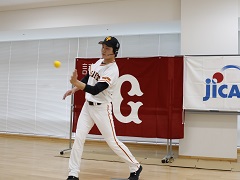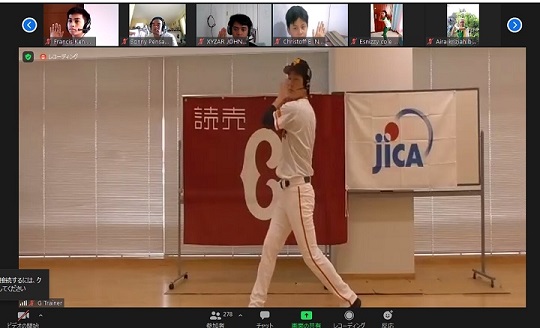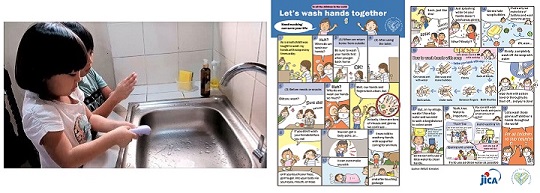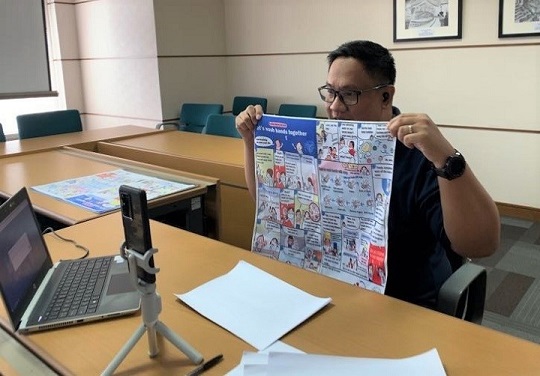Yomiuri Giants online baseball camp held for children in the Philippines
2021.03.30
Former Yomiuri Giants professional baseball players led an online baseball camp for children in Mindanao, Philippines. About 300 children participated with sparkling eyes as they moved their bodies together with the coaches.
Since signing a memorandum of understanding (MOU) to popularize and promote baseball in 2015, JICA and the Yomiuri Giants have been holding baseball camps in various countries and working together to disseminate “Japanese-style baseball,” which emphasizes the importance of courtesy. Last year, this training camp was held in Mindanao. This year, however, due to the concerns over COVID-19, it was held online. Along with baseball trainings, a program to promote proper handwashing to prevent infectious diseases was conducted. The children had a fantastic time learning from the online event.

Left: Coaches TSUJI Harutomo (left) and KANEKO Taishi (right) of the Giants Academy who instructed the children
Right: Children who participated in the online baseball camp
The two coaches who instructed the children in the online baseball camp in February were former-professional player TSUJI Harutomo and KANEKO Taishi, who are now with the Giants Academy of the baseball club. In the batting training, they went over the basic movements of the upper and lower body. Given the local situation where baseball equipment may not be readily available, they used the balls and bats made of paper that they had prepared in advance. During catching training, participants competed with each other to see how many times they could clap their hands before the ball they tossed into the air fell back into their hands. “Great job!” The children who could clap their hands the most were praised by the coaches.

Mr. Tsuji giving practical tips during batting training
Mr. Tsuji, who led the training sessions, said, “Even though the training was online, it was delightful to see the children practicing and improving their skills.”
Currently, the Philippines is still under quarantine restrictions to prevent the spread of COVID-19. Since March last year, school classes have been held online, and face-to-face courses have not yet resumed. The baseball sessions, therefore, focused on basic practices and exercises that can be done at home. It turned out to be a valuable experience for the children who have been unable to enjoy sports as much as they would like amidst the epidemic.
SUGIYAMA Hideo, a staff member of JICA's Southeast Asia and Pacific Department, who helped organize the online baseball camp, said, "The coaches from the Giants Academy touched on the importance of the mental aspects in addition to the technical aspects, and the children earnestly listened to them. In JICA's future activities for youth development through sports in the Philippines, we would like to continue our efforts to coach both the technical and mental aspects of sports.”

The children moved their bodies together with Mr. Tsuji through their monitors
Davao City, located in the Mindanao island, has been home to many Japanese immigrants since the Meiji era. In the city. Baseball has long been promoted as an aspect of support for the Japanese community through private exchanges, and baseball tournaments have been held there since 2006.
President Ines Mallari of the Mindanao Kokusai Daigaku, which has been making efforts to promote baseball in Davao City, said, "Children in the Philippines love to play baseball, but it is difficult for them to improve their skills because they do not have baseball equipment such as gloves and bats, and there are no coaches with professional knowledge and techniques. The baseball camp is a valuable opportunity for the children to deepen their understanding of baseball by learning from professional coaches.”
This online event was not only attended by student players and coaches from Davao City and its surrounding area, where many people of Japanese descent reside, but also by young baseball players from the Bangsamoro Autonomous Region in Muslim Mindanao (BARMM). JICA has been providing support towards a comprehensive peace and development in this region over decades.
Commenting on the significance of peace and sports, SANO Yukiko, a staff member of the JICA Philippines Office, said, "I am excited that participants from BARMM, where numerous communities have been affected by conflict for many long years, were able to participate in the baseball camp. We started this project with the idea to further promote peace through sports, but last year these children were unable to participate due to difficulties in travel. However, because it was held online this time, they were able to join.”
After the baseball sessions, a video and manga were shown to the children introducing the importance of handwashing. As handwashing is now reconsidered as an important preventive measure against the spread of COVID-19, the video illustrated the right timing and the most effective way of handwashing, adapted to the lifestyles of children in the Philippines. The JICA Philippines Office has also created a handkerchief with the manga printed on it, which will be distributed to each child who participated in the online event. We aim to educate and make handwashing a daily practice for them.

Left: Handwashing in children's daily lives was introduced in the “Handwashing Video”
Right: “Let’s Wash Hands Together” manga produced by JICA for children in developing countries, which has been translated into 27 languages as of March 2021
Kessy Reyes, a staff member of the JICA Philippines Office, who taught the importance of handwashing to the children, spoke about the response to the awareness of handwashing. “It was challenging because mutual communication was limited in comparison to a regular face-to-face event. I think, however, that we were able to convey the message that ‘washing hands properly at the right time, such as when you come back home or after doing chores, will lead to good health’.”

JICA staff member Mr. Reyes holds a handkerchief printed with the "Let’s Wash Hands Together" manga to promote handwashing
scroll